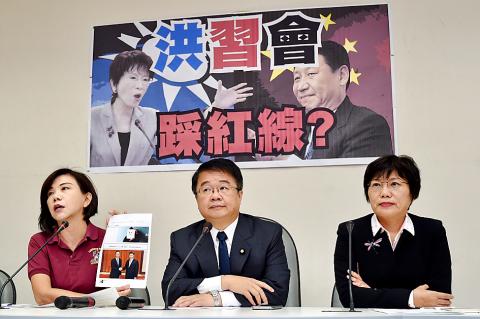The Democratic Progressive Party (DPP) caucus yesterday called on Chinese Nationalist Party (KMT) Chairwoman Hung Hsiu-chu (洪秀柱) not to sign any agreements with China, amid speculation that Hung might propose a peace treaty at a meeting with Chinese President Xi Jinping (習近平) today.
Ahead of the annual forum between the KMT and the Chinese Communist Party (CCP) in Beijing today, the caucus reiterated that it is a party-to-party event and warned Hung not to cross the “red line” by proposing bilateral agreements without government authorization, DPP caucus chief executive Wu Ping-jui (吳秉叡) said.
According to the Act Governing Relations Between the People of the Taiwan Area and the Mainland Area (兩岸人民關係條例), Taiwanese individuals and organizations are prohibited from entering into any political agreement with China unless authorized by the government, Wu said.

Photo: Chien Jung-fong, Taipei Times
Hung might try to seek concessions from China to build her legacy and secure her position against a potential challenge by former vice president Wu Den-yih (吳敦義) in the KMT chairperson election, Wu Ping-jui said.
When running as a presidential candidate, Hung showed a strong inclination toward unification with China, as she said that the so-called “1992 consensus” could evolve from the “one China, different interpretations” framework to “one China, same interpretation,” causing senior KMT members to try to muzzle her ahead of the meeting, he said.
The so-called “1992 consensus” — a term former Mainland Affairs Council chairman Su Chi (蘇起) admitted making up in 2000 — refers to a tacit understanding between the KMT and the Chinese government that both sides of the Taiwan Strait acknowledge there is “one China,” with each side having its own interpretation of what “China” means.
“It is a fake issue to distinguish between ‘same interpretation’ and ‘different interpretations,’ because none of the KMT delegates [to the forum] dare mention ‘different interpretations,’” DPP Legislator Lee Chun-yi (李俊俋) said.
The “eight understandings” reached between a Taiwanese delegation of eight local government leaders — consisting mostly of KMT officials — and China last month was already a breach of the act, Lee said.
DPP Legislator Yeh Yi-jin (葉宜津) said Hung had proposed that a peace treaty be signed between Taiwan and China, but no political party has the right to negotiate international treaties, especially when the KMT is not even in power.
Since former vice president Lien Chan’s (連戰) meeting with former Chinese president Jiang Zemin (江澤民) in 2005, the KMT has made it a tradition to hold talks with the CCP under the “1992 consensus” framework, but that framework has been undermined, Yeh said.
In their separate meetings with Xi, former KMT chairman Wu Po-hsiung (吳伯雄) reiterated the “1992 consensus” and opposed Taiwanese independence, while former KMT chairman Eric Chu (朱立倫) urged increased bilateral cooperation in the Asia-Pacific region based on the “1992 consensus.”
However, former president Ma Ying-jeou (馬英九) stressed the bond between Taiwan and China under the “one China” framework of the “1992 consensus,” Yeh said.
The DPP does not accept the “one China” principle and Hung should not make any concessions on the cross-strait relationship, Yeh said.

US President Donald Trump said "it’s up to" Chinese President Xi Jinping (習近平) what China does on Taiwan, but that he would be "very unhappy" with a change in the "status quo," the New York Times said in an interview published yesterday. Xi "considers it to be a part of China, and that’s up to him what he’s going to be doing," Trump told the newspaper on Wednesday. "But I’ve expressed to him that I would be very unhappy if he did that, and I don’t think he’ll do that," he added. "I hope he doesn’t do that." Trump made the comments in

NOT AN OPENING: Trump’s violation of international law does not affect China’s consideration in attacking Taiwan; Beijing lacks capability, not precedent, an official said Taiwanese officials see the US’ capture of the president of Venezuela as a powerful deterrent to Beijing’s aggression and a timely reminder of the US’ ability to defeat militaries equipped with Chinese-made weapons. The strikes that toppled Venezuelan President Nicolas Maduro signaled to authoritarian leaders, including Chinese President Xi Jinping (習近平), US President Donald Trump’s willingness to use military might for international affairs core to US interests, one senior official in Taipei’s security circle said. That reassured Taiwan, the person said. Taipei has also dismissed the idea that Trump’s apparent violation of international law could embolden Beijing, said the official, who was not

A cold surge advisory was today issued for 18 cities and counties across Taiwan, with temperatures of below 10°C forecast during the day and into tonight, the Central Weather Administration (CWA) said. New Taipei City, Taipei, Taoyuan and Hsinchu, Miaoli and Yilan counties are expected to experience sustained temperatures of 10°C or lower, the CWA said. Temperatures are likely to temporarily drop below 10°C in most other areas, except Taitung, Pingtung, Penghu and Lienchiang (Matsu) counties, CWA data showed. The cold weather is being caused by a strong continental cold air mass, combined with radiative cooling, a process in which heat escapes from

Snow this morning fell on Alishan for the first time in seven years, as a strong continental cold air mass sent temperatures plunging across Taiwan, the Central Weather Administration (CWA) said. The Alishan weather station, located at an elevation of about 2,200m in central Taiwan, recorded snowfall from 8:55am to 9:15am, when the temperature dropped to about 1°C, the CWA said. With increased moisture and low temperatures in the high-altitude Alishan area, the conditions were favorable for snow, CWA forecaster Tsai Yi-chi (蔡伊其) said. The last time snow fell at the Alishan weather station was on Jan. 10, 2018, while graupel fell there